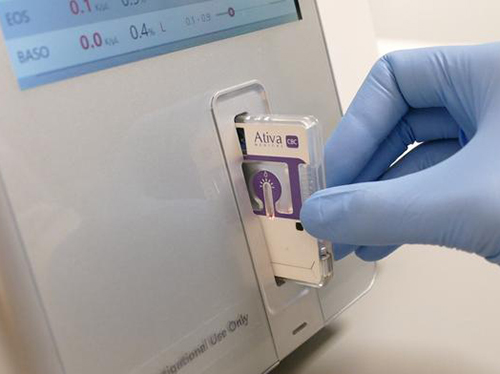Minnesota startup’s ‘breakthrough’ technology aims to deliver point-of-care blood and urine test results within minutes for an estimated $8/single-use test cartridge
Less than a year has passed since blood-testing company Theranos dissolved and saw its top two executives Ramesh “Sunny” Balwani and Elizabeth Holmes indicted for fraud. Now, Ativa Medical, is boasting revolutionary technology that brings similar blood-testing technology to the point of care. After the Theranos debacle, the logical question for clinical laboratories is—will it work?
According to the St. Paul, Minn.-based diagnostic startup’s website, “Our breakthrough fluid processing engine will enable the full analytical processes used in large core lab blood analyzers to be performed affordably and entirely on a low-cost disposable card, within minutes at the point of care.” Sound familiar?
Though still under development and not yet approved by the US Food and Drug Administration (FDA), Ativa claims the MicroLAB system, “will enable a broad range of hematology and chemistry testing to be performed on a single test system for the first time.” The system will replicate large-core lab-blood analyzer results within minutes at the point-of-care using a disposable test cartridge with an estimated $8/test cost, the Minneapolis Star Tribune noted.
“We have a team here that is really good at doing really difficult things,” Ativa co-founder and Chief Technology Officer David Deetz, PhD, told the Star Tribune. “We usually [form startup] companies where the last 10 companies have failed.”

Ativa is positioning its MicroLAB system (above) to be the laboratory industry’s next disrupter. The company says its initial test card panels will be aimed at diagnosing patients with acute conditions in primary care settings. It will first introduce a complete blood count panel, followed by a basic metabolic panel and urine panel. Phase two of development will add “focused critical test panels, including those needed to manage patients with chronic conditions,” Ativa’s website states. (Photo copyright: Minneapolis/St. Paul Business Journal.)
Is Ativa a Phoenix Rising?
Ativa is rising through the ashes of Theranos, which at its pinnacle was valued at $9 billion based on claims of “breakthrough advancements” that made it possible to “quickly process the full range of laboratory tests from a few drops of blood,” The Wall Street Journal (WSJ) reported.
In reality, the company’s proprietary blood-testing system was unable to live up to Theranos’ marketing hype and claims. It turned out, as the WSJ revealed, Theranos had been performing “the vast majority of its tests with traditional machines from companies like Siemens AG.”
The Theranos curtain began closing on Theranos in June 2018, when Holmes and Balwani were indicted on two counts of conspiracy to commit wire fraud against Theranos investors, doctors, and patients, as well as nine counts of wire fraud. (Both have pled not guilty.)
Three months later, the company announced plans to formally dissolve, the WSJ reported.

Pathologist Brad S. Karon, MD, PhD, Mayo Clinic Departments of Laboratory Medicine and Pathology, told the Star Tribune, “[MicroLAB’s] microfluidic technology to produce the right sample, like a plasma-like substance to measure glucose, or sodium or potassium or all electrolytes, is not new. And it is being done well now,” Karon explained. “What no one is doing well now—and is a home run for whoever does it first—is the universal platform.” [Photo copyright: Mayo Clinic.)
Theranos’ Taint on Capital Funding
Point-of-care technology has long been both disruptive and transformative to clinical laboratories. A trend on which Dark Daily has often reported.
According to Grand View Research, in 2016, the global market for point-of-care diagnostics was estimated at $6.3 billion. However, the ghost of Theranos continues to hang over venture capital funding for emerging technologies, and this dark cloud has hampered Ativa’s quest for funding.
“This technology—the concept—is amazing. I think that’s why people were willing to go down that road with Theranos,” Kathleen Tune, Managing Director of Minneapolis’ Fourth Element Capital, told the Star Tribune. “But I’m sure [Theranos’ collapse] did cause a taint on the technology area.”
North Carolina-based Laboratory Corporation of America (LabCorp), a leading global diagnostics company, became an investor in Ativa in 2015 when it joined a global syndicate supplying $15 million in new Series B equity financing to the company, VCAOnline.com reported. Yet, traditional venture capital funding for MicroLAB has been in short supply, forcing Ativa to turn to China’s Ping An Ventures and so-called angel investors in the US for much of the $50 million in venture capital that’s been secured, the Star Tribune reported.
The collapse of Theranos has created not only a more challenging financial environment in which Ativa and other startups must operate, but it also means all companies touting diagnostic breakthroughs in the clinical laboratory space will face a more intense spotlight.
“The basic question at Theranos was, where was the demonstrated evidence that could validate the claims that the company was offering?” Jodi Hubler, Managing Director at Minnetonka, Minn.-based Lemhi Ventures, told the Star Tribune. “Those that follow them [such as Ativa] are going to face what might feel like an additional level of scrutiny.”
MicroLAB is expected to received Waived Test status under the Clinical Laboratory Improvement Amendments of 1998 (CLIA), the Star Tribune reports.
Time will tell if Ativa can bring its promise of inexpensive, accurate, and rapid blood testing at the point of care to fruition. If it succeeds where Theranos failed, clinical laboratories may face new challenges to their workflow and bottom line, while healthcare consumers will celebrate easier access to the diagnostic testing they demand.
—Andrea Downing Peck
Related Information:
Can St. Paul Startup Succeed Where Theranos failed? Ativa Bets on $8 Blood Tests
Hot Startup Theranos Has Struggled with Its Blood-Test Technology
United States of America vs. Elizabeth A. Holmes and Ramesh “Sunny” Balwani
Blood-Testing Firm Theranos to Dissolve



